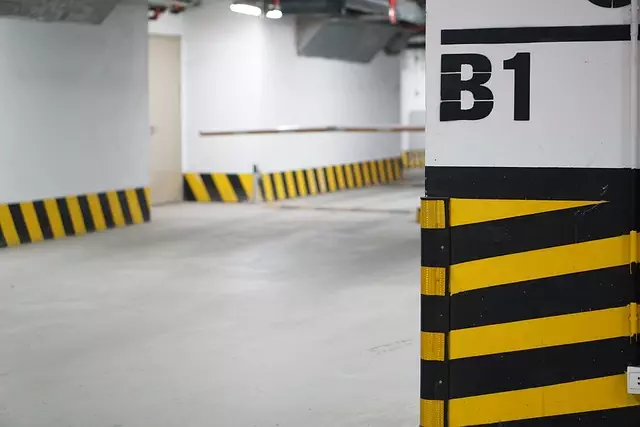Toledo, Ohio has pioneered sustainable asphalt parking lot construction through the use of permeable asphalt technology, which enhances water management by allowing rainwater to percolate through the pavement, thus reducing flood risks and preserving local ecosystems. This approach also incorporates recycled materials in asphalt mixes, conserving energy and reducing greenhouse gas emissions from new aggregate production. Contractors in Toledo utilize advanced methods and equipment for precise layering, ensuring durability and longevity of these lots while contributing to environmental conservation. The city's commitment to sustainable practices not only extends the life of asphalt parking lots but also sets a precedent for other municipalities looking to adopt eco-friendly urban development solutions that balance functionality with environmental stewardship. Toledo's innovative construction techniques in asphalt parking lot construction serve as a model, emphasizing the importance of sustainable infrastructure integration and proactive maintenance strategies to ensure long-term performance and compliance with local codes and best practices in its unique climatic conditions. Regular inspections, sealcoating, and maintenance are key to maintaining Toledo's asphalt parking lots against the city's environmental stressors, ensuring their functionality, safety, and aesthetic value for years to come.
As urban centers and private entities strive for eco-conscious infrastructure solutions, permeable asphalt parking lots have emerged as a pivotal innovation. These sophisticated constructions not only enhance durability and sustainability but also significantly contribute to environmental health by managing stormwater runoff and reducing the carbon footprint associated with traditional asphalt parking lot construction. Toledo, Ohio, has set an example with its pioneering approach in this domain. This article delves into the transformative impact of permeable asphalt within modern asphalt parking lot design, highlighting the benefits and best practices that make it a sustainable choice for urban spaces. Join us as we explore how Toledo’s innovative strategies in asphalt parking lot construction are setting a new standard for eco-friendly pavement solutions.
- Maximizing Durability and Sustainability: Asphalt Parking Lot Construction Techniques
- Case Study: Toledo Ohio's Innovative Approach to Asphalt Parking Lot Construction
- The Role of Permeable Pavements in Modern Asphalt Parking Lot Design
- Advantages of Permeable Asphalt for Eco-Friendly Parking Solutions
- Choosing the Right Base and Subbase for Optimal Asphalt Parking Lot Performance
- Maintenance Best Practices for Long-Term Success of Asphalt Parking Lots in Toledo, Ohio
Maximizing Durability and Sustainability: Asphalt Parking Lot Construction Techniques

In the realm of asphalt parking lot construction, innovation and environmentally conscious techniques play a pivotal role in maximizing durability and sustainability. Modern construction practices in Toledo, Ohio, and beyond are increasingly incorporating advanced methods to ensure that these lots not only endure the test of time but also minimize their environmental footprint. For instance, the use of permeable asphalt allows for better water management by enabling rainwater to filter through the pavement into an underlying stone layer and then into the ground, reducing runoff and mitigating flooding risks. This eco-friendly approach not only supports local ecosystems but also extends the lifespan of the parking lot by preventing structural damage caused by water accumulation.
Furthermore, the integration of recycled materials in asphalt mixes is another key strategy in sustainable construction. These materials contribute to a reduction in energy consumption and greenhouse gas emissions associated with producing new aggregate. Contractors specializing in Toledo Ohio asphalt parking lot construction often employ state-of-the-art equipment and techniques to ensure precise layering, which promotes even distribution of weight and reduces the likelihood of pavement failure. By adhering to these sustainable practices, the durability of asphalt parking lots is significantly enhanced, ensuring they remain functional and aesthetically pleasing for years to come while also contributing positively to environmental conservation efforts.
Case Study: Toledo Ohio's Innovative Approach to Asphalt Parking Lot Construction

Toledo, Ohio, has paved the way in sustainable infrastructure with its innovative approach to asphalt parking lot construction. The city has implemented a forward-thinking strategy that incorporates permeable asphalt technology, which not only enhances water management but also contributes to environmental conservation. This eco-friendly solution allows for the efficient infiltration of rainwater, reducing runoff and mitigating the risk of flooding. The permeable asphalt parking lot construction in Toledo is a testament to the city’s commitment to integrating green infrastructure into urban landscapes.
The benefits of this approach are manifold. Not only does it address stormwater management challenges, but it also requires less maintenance over time due to its durable and porous nature. The permeable asphalt allows for air and water to circulate through the pavement, which can lead to reduced greenhouse gas emissions from fewer needs for deicing chemicals and less need for water-sealing treatments. Toledo’s initiative sets a precedent for other municipalities looking to upgrade their parking lot construction with sustainable materials and practices. The city’s successful implementation of permeable asphalt in its parking lots serves as a model for urban development that balances functionality with environmental stewardship.
The Role of Permeable Pavements in Modern Asphalt Parking Lot Design

As urban planning and environmental awareness evolve, the integration of sustainable infrastructure has become a priority in modern development. Within this context, asphalt parking lot construction has undergone significant changes, with permeable pavements emerging as a key solution for managing stormwater and reducing the carbon footprint of urban environments. These innovative paving systems allow water to seep through the asphalt surface into underlying aggregate, which then directs the water to infiltrate the ground or discharge it to a detention system. This approach not only mitigates the risk of flooding by increasing stormwater absorption capacity but also supports the recharge of local aquifers. In Toledo, Ohio, for instance, asphalt parking lot construction incorporating these permeable technologies is becoming increasingly prevalent, reflecting a commitment to sustainability and infrastructure resilience. Local authorities and developers are recognizing the benefits of such systems, which include prolonged pavement life, reduced maintenance costs, and compliance with environmental regulations. As a result, Toledo, Ohio, is setting a precedent for other cities to follow in adopting eco-friendly asphalt parking lot construction practices that prioritize sustainability without compromising functionality.
Advantages of Permeable Asphalt for Eco-Friendly Parking Solutions

Incorporating permeable asphalt in parking lot construction presents a suite of environmental benefits, positioning it as an eco-friendly solution for modern infrastructure needs. Unlike traditional impervious surfaces, permeable asphalt allows water to filter through its structure into the underlying aggregate, mimicking the natural water filtration process. This feature significantly reduces runoff, which is a major source of water pollution and can lead to flooding issues in urban areas. The environmental advantages extend beyond water conservation; permeable asphalt also contributes to the reduction of heat island effect by allowing for cooler surface temperatures compared to standard asphalt. This not only improves local microclimates but also enhances the comfort and energy efficiency of surrounding buildings and structures.
In Toledo, Ohio, asphalt parking lot construction is adapting to these eco-conscious advancements. The city, with its strategic location on the Maumee River and Lake Erie, faces unique challenges related to stormwater management and water quality. By opting for permeable asphalt solutions, Toledo can mitigate these issues effectively. The choice of permeable asphalt parking lot construction in this region reflects a commitment to sustainability and resilience, aligning with the broader environmental goals of the city. The use of permeable asphalt not only supports local ecological preservation but also aligns with the infrastructure maintenance priorities, offering a durable and long-lasting alternative to traditional asphalt. This approach to asphalt parking lot construction in Toledo exemplifies how innovative pavement solutions can contribute significantly to environmental stewardship and urban sustainability.
Choosing the Right Base and Subbase for Optimal Asphalt Parking Lot Performance

When constructing an asphalt parking lot, the foundation’s composition plays a pivotal role in its longevity and performance. The base and subbase layers are critical components of asphalt parking lot construction in Toledo, Ohio, as they provide the necessary support and stability to withstand the weight of vehicles and the fluctuating environmental conditions. Selecting the appropriate materials for these layers is essential; a well-prepared base typically consists of engineered material like limestone, granite, or other aggregates that are compacted and designed to offer uniform support. The subbase, which sits below the base, is composed of larger aggregate particles that promote proper drainage and further enhance the structural integrity of the parking lot. In Toledo’s climate, with its varying precipitation levels and freeze-thaw cycles, these layers must be carefully chosen to prevent damage from water intrusion or surface erosion. Adequate subbase thickness is crucial for preventing the migration of fines into the underlying soil, which can compromise the lot’s structure over time. Properly executing asphalt parking lot construction in Toledo, Ohio, with a focus on robust base and subbase layers ensures that the final pavement will endure the elements and maintain safe, accessible, and durable parking spaces for years to come.
In Toledo, Ohio, adhering to best practices in asphalt parking lot construction is not just about meeting local codes; it’s about creating a structure that can stand the test of time. The selection of materials and their installation must be carried out by experienced contractors who understand the unique challenges posed by the region’s soil conditions and weather patterns. A thorough evaluation of the site is necessary to determine the most suitable base and subbase materials, which may vary from one location to another within Toledo. Engaging with local experts in asphalt parking lot construction can provide insights into the best practices for your specific project, ensuring that every layer is laid with precision and care. This meticulous approach not only contributes to the longevity of the parking lot but also enhances its safety and functionality, making it a valuable asset for any business or institution in Toledo, Ohio.
Maintenance Best Practices for Long-Term Success of Asphalt Parking Lots in Toledo, Ohio

When considering the long-term success of an asphalt parking lot in Toledo, Ohio, adhering to maintenance best practices is paramount. Regular inspections and timely interventions can significantly extend the lifespan of the asphalt parking lot construction. In Toledo’s diverse climate, which includes harsh winters and hot summers, the asphalt is subjected to extensive stress and weather changes. To mitigate the effects of these conditions, it is crucial to implement a proactive maintenance schedule that includes sealcoating every two to three years to protect against water damage and oxidation; crack filling to prevent moisture intrusion; and drainage system checks to ensure proper water flow away from the asphalt surface.
Effective drainage is a key factor in maintaining an asphalt parking lot in Toledo, Ohio. The city’s rainfall patterns necessitate a robust drainage system that channels water away from the lot to prevent pooling and seepage, which can lead to structural damage over time. Additionally, regular cleaning, line striping updates, and ADA compliance checks should be part of the routine maintenance. Engaging experienced contractors specializing in asphalt parking lot construction in Toledo, Ohio, for these tasks ensures that each phase of maintenance is executed with precision and care, contributing to the longevity and safety of the parking area. By focusing on preventive maintenance and working with knowledgeable professionals, property owners can safeguard their investment and maintain a functional, safe, and welcoming parking environment.


